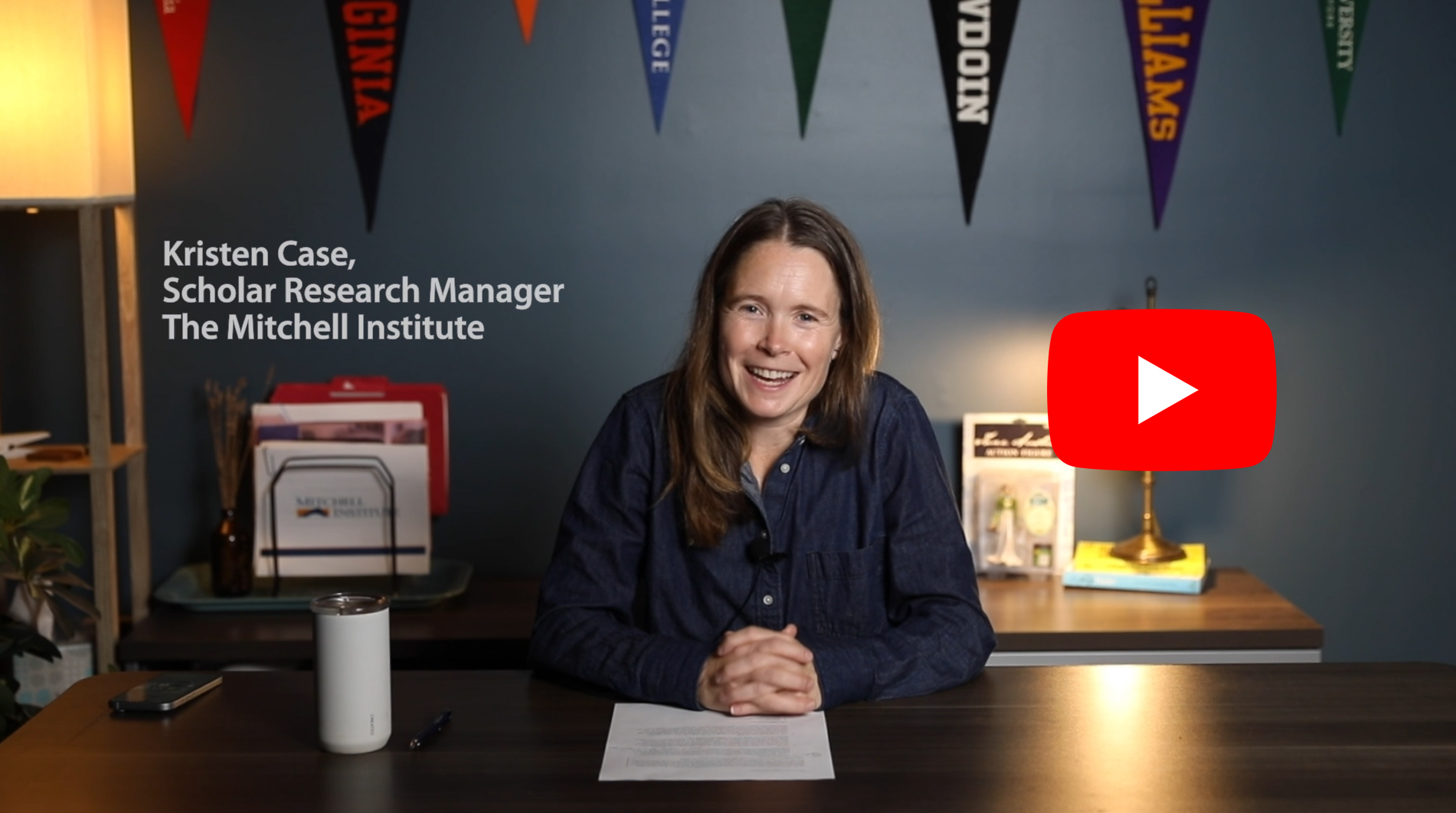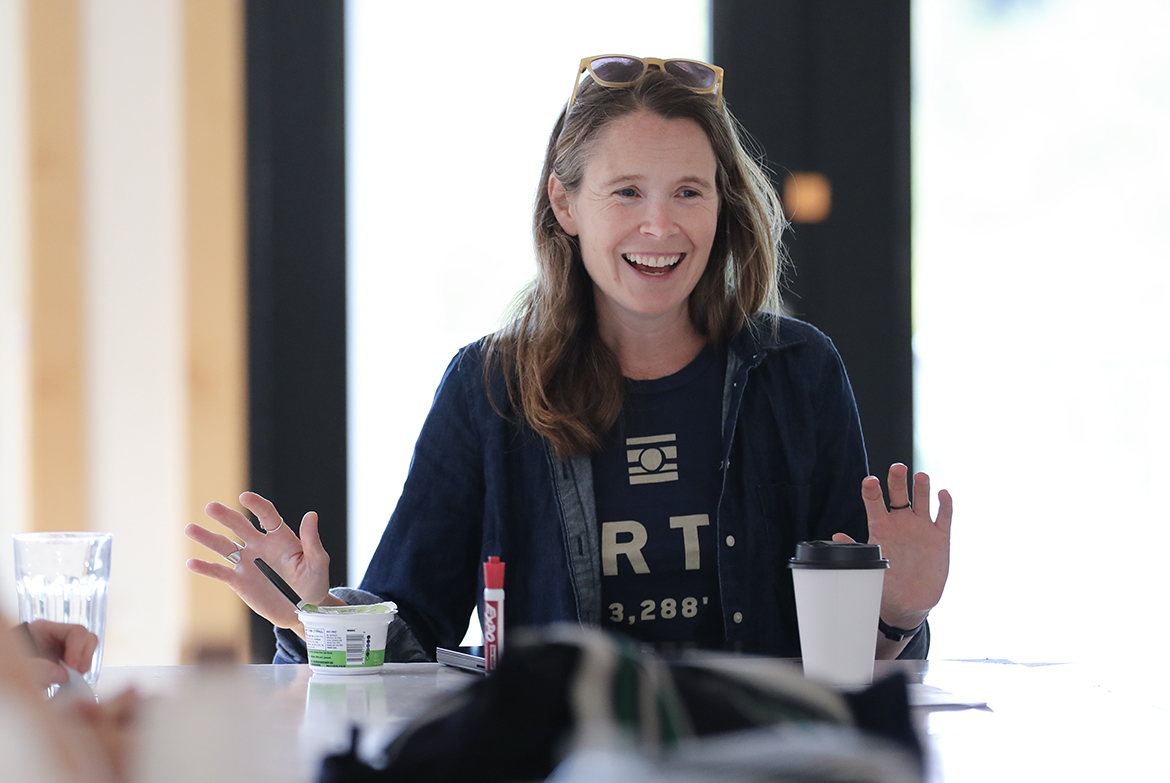
As the still-newish Scholar Research and Grants Manager, Kristen Case spends a lot of her days researching and analyzing Mitchell Scholar outcomes and developing funding proposals for foundations whose philanthropic investments are aligned with the Mitchell Institute’s mission and work.
But there’s another Scholar-facing element to Case’s portfolio that’s new to the role: She also coaches Mitchell Scholars and alumni who are interested in pursuing graduate study in the humanities and careers in academia — and pursuing opportunities that call for compelling personal and professional narratives.
The new advising duties completely befit Case’s background. Prior to joining the Mitchell Institute, she was a full Professor of English, specializing in teaching American Literature, at the University of Maine at Farmington. Case annually advised as many as 15 English majors at UMF, helping them navigate their paths to their degrees, careers in the field, and, on many occasions, graduate school.
With her new video series, “How to Do College Right with Kristen,” Case is now able to take what she’s learned about advising college students — many of them Pell-eligible — and share it with all 625 currently enrolled Mitchell Scholars.

Click the image above to see the YouTube playlist comprising all four videos.
Over four brief videos that each move at an easily digestible clip, Case shares her pro tips for making the most of college — for academic success and personal satisfaction. And she came to the idea of the video series after examining the results of the most recent Mitchell Scholar Alumni Survey.
“It was really clear that what I experienced through teaching and advising students at UMF was also true within our Scholar population — some students really make the most of their time in college. They don’t just go to class, they embrace the full range of opportunities college makes possible for them,” Case said. “These students don’t just graduate with a degree, they have built a whole library of experiences and skills and relationships that can help them in the next phase of their lives.”
Perhaps that’s why Case emphasizes this overarching bit of advice for Mitchell Scholars as they consider classes in new-to-them academic disciplines, study-abroad opportunities, internships, and their school’s menu of extracurricular activities, clubs, organizations: Say yes.
“Saying yes is about what you imagine to be possible for yourself. Being able to imagine beyond our current circumstances is absolutely key to building a sustainable and rewarding life, both for ourselves individually and for our communities,” she said. “Flexing our imaginative muscles by saying yes when new opportunities come our way doesn’t just open those opportunities, it instills a habit of openness that can last a lifetime and lead to greater well-being, learning, and joy in life.”
Case says developing this habit of mind is especially important for under-resourced college students. They may have difficulty embracing new opportunities because they are risk averse (anything that might impact their ability to succeed with essential coursework must be passed over, the thinking goes), or they may believe participation will require additional financial resources they simply do not have.
“Sometimes, when we have lived with scarcity or have been told ‘no’ many times, we can lose this natural imaginative capacity,” Case said. “It’s important to exercise it when you have the chance — especially in college, when you are setting up the mental habits that you will take with you into post-college life.”
That’s why Case pairs each bit of advice related to saying yes or taking on a new challenge with a reminder: The Mitchell Institute is here to support you. And that support can come in many forms, including fellowship funding for an unpaid or underpaid internship or the living expenses or travel costs associated with an internship; supplemental funding to help ensure that unforeseen and recurring expenses don’t derail Scholars’ progress toward earning a degree; and one-on-one advising to coach Scholars through challenges.
“The biggest thing that has changed since I was in college is the cost, and this has ripple effects that reach into every aspect of the college experience,” she said. “It’s a lot harder for students now that it was for students of my generation to afford and find time for the kinds of experiences — study abroad, working closely with a professor, writing a thesis, etc. — that we know have a big impact on people’s lives after college.”

In the final video of her series, Case shares her “bucket list” of six things every college student should aim to do before graduation: join a club, study abroad, complete an internship, conduct research with a professor, complete a capstone project or senior thesis, and find a mentor. And if she seems passionate about these or any of the pro tips, it’s not just her nature coming through. After nearly 15 years of teaching and advising college students, she knows how each recommendation can be life changing. The difference now is that she can help coordinate resources to make them a reality.
“The Mitchell Institute is proud of our reputation to provide ‘more than a scholarship,’ and we are committed to helping Scholars not just graduate but really get the most out of college,” Case said. “Through no-agenda coffees, emergency funds, and fellowships, we offer Mitchell Scholars ways to overcome the many challenges they may face in today’s college landscape. Ultimately, the Scholars are the ones who have to bet on themselves and ‘say yes’ to access the best of what college has to offer. But we’re here to cheer them on, and to lend a hand.”
More on Case: Prior to joining the Mitchell Institute, she founded and continues to co-direct the Monson Seminar, a three-week residential course for highly motivated Pell-eligible and first-generation college students pursuing creative and research-based projects. Building on her first professional experiences as an elementary and middle-school classroom teacher, she continues to emphasize the importance of expanding the aspirations of first-generation college students along with their intellectual development.
